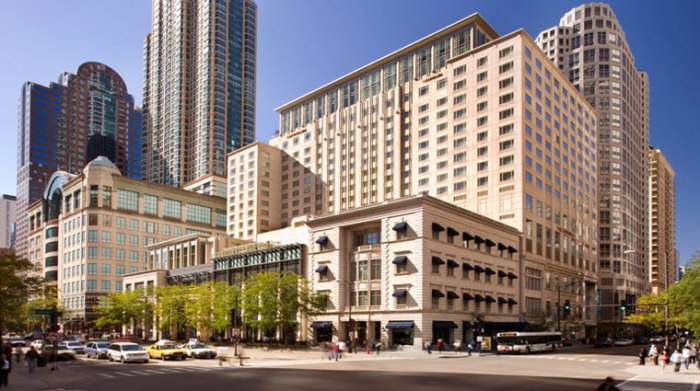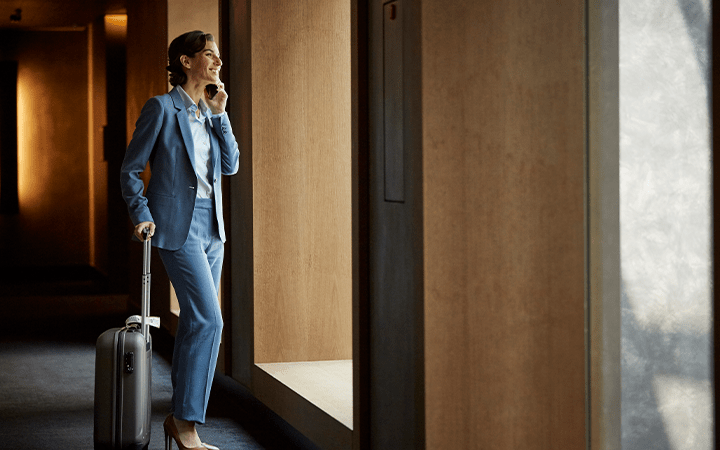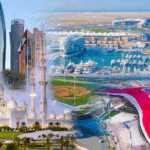Best Hotels for Business Travelers are more than just a place to sleep; they are strategic hubs for productivity and comfort. This guide delves into the crucial elements that define a superior business hotel, exploring everything from essential amenities and convenient locations to business-friendly services and cost-effectiveness. We’ll examine what makes a hotel truly stand out for the discerning business traveler, ultimately helping you choose accommodations that enhance, not hinder, your professional journey.
From understanding the varying needs of different business traveler profiles—solo entrepreneurs, corporate executives, and consultants—to navigating the complexities of hotel pricing and leveraging corporate rates, this guide provides a holistic perspective. We’ll also examine how to effectively utilize online reviews and ratings to make informed decisions, ensuring your business trip is both efficient and enjoyable.
Top Hotel Amenities for Business Travelers

Source: forbestravelguide.com
Selecting the right hotel for a business trip significantly impacts productivity and overall experience. The right amenities can transform a simple overnight stay into a productive and comfortable extension of the workday, minimizing stress and maximizing efficiency. Understanding which amenities are most valued by business travelers is crucial for both travelers and hotel providers.
Top Ten Hotel Amenities for Business Travelers
Business travelers prioritize amenities that enhance productivity, comfort, and convenience. The following list ranks ten highly desirable amenities, considering their impact on a successful business trip.
- High-speed, reliable Wi-Fi
- Ergonomic workspace
- 24-hour business center
- Meeting rooms/conference facilities
- Fitness center/gym
- On-site restaurant with healthy options
- Laundry/valet service
- Excellent soundproofing
- Comfortable and spacious rooms
- Convenient location with easy access to transportation
These amenities contribute to a seamless and efficient business trip. High-speed internet is essential for communication and data transfer, while ergonomic workspaces promote comfort and prevent fatigue during long work hours. A well-equipped business center allows for printing, scanning, and other essential tasks, while meeting rooms facilitate effective client meetings. Fitness centers help maintain a healthy lifestyle while on the road, and convenient on-site dining ensures quick and nutritious meals.
Laundry services save valuable time, and soundproofing guarantees a peaceful night’s sleep and uninterrupted work. Spacious rooms offer ample space for work and relaxation, and a convenient location streamlines travel to and from meetings and appointments.
Amenity Comparison Table
The following table provides a detailed comparison of the ten amenities, highlighting their benefits and importance for business travelers.
| Amenity | Benefit | Example | Importance Ranking |
|---|---|---|---|
| High-speed, reliable Wi-Fi | Enables seamless communication and data transfer. | Fiber optic internet with guaranteed speeds. | 1 |
| Ergonomic workspace | Promotes comfort and prevents fatigue during long work hours. | Adjustable desk, comfortable chair, good lighting. | 2 |
| 24-hour business center | Provides access to printing, scanning, and other essential business services at any time. | Equipped with computers, printers, fax machines, and staff assistance. | 3 |
| Meeting rooms/conference facilities | Facilitates efficient client meetings and presentations. | Rooms with projectors, screens, and video conferencing capabilities. | 4 |
| Fitness center/gym | Allows for maintaining a healthy lifestyle while traveling. | Well-equipped gym with cardio and weight training equipment. | 5 |
| On-site restaurant with healthy options | Provides convenient access to nutritious meals. | Restaurant offering salads, fresh fruit, and other healthy choices. | 6 |
| Laundry/valet service | Saves time and effort by handling laundry needs. | Same-day dry cleaning and laundry services. | 7 |
| Excellent soundproofing | Ensures a peaceful night’s sleep and uninterrupted work. | Thick walls and windows that minimize outside noise. | 8 |
| Comfortable and spacious rooms | Provides ample space for work and relaxation. | Large rooms with comfortable beds and ample workspace. | 9 |
| Convenient location with easy access to transportation | Streamlines travel to and from meetings and appointments. | Hotel located near public transport or with easy access to highways. | 10 |
Location and Accessibility for Business Hotels
Choosing a hotel with a convenient location is paramount for business travelers. Proximity to key business areas, efficient transportation links, and ease of access to meeting venues significantly impact productivity and reduce travel time and stress. The ideal location varies greatly depending on the type of business traveler and their specific needs.The importance of location cannot be overstated; it directly affects a business traveler’s efficiency and overall experience.
A poorly located hotel can lead to wasted time commuting, missed meetings, and increased travel expenses. Conversely, a well-situated hotel allows for seamless integration into the business trip, maximizing time and minimizing disruption.
Location Needs of Different Business Traveler Types
Different types of business travelers have varying location priorities. Solo entrepreneurs often prioritize cost-effectiveness and proximity to co-working spaces or client meetings, potentially foregoing luxury amenities for a more central location. Corporate executives, on the other hand, may favor hotels within prestigious business districts offering high-end amenities and easy access to corporate headquarters. Consultants, frequently juggling multiple client meetings across a city, require a hotel with excellent access to various transportation options and a strategic central location allowing for efficient movement between engagements.
Crucial Accessibility Factors for Business Hotels
Several key factors determine a hotel’s accessibility for business travelers. Considering these aspects ensures a smooth and productive trip.
- Proximity to Business Districts: Hotels located within or near major business districts minimize commute times and allow for easy access to client meetings and corporate offices. For example, a hotel near the financial district in a major city would be ideal for financial professionals.
- Transportation Hub Connectivity: Easy access to airports, train stations, and public transportation is crucial. A hotel with direct access to a subway line or a complimentary shuttle service to the airport significantly enhances convenience. Consider a hotel near a major transportation hub like Grand Central Terminal in New York City.
- Proximity to Meeting Venues: For those attending conferences or conducting business meetings, proximity to conference centers or meeting facilities is a significant advantage. A hotel directly connected to a convention center eliminates the need for lengthy commutes and potential delays.
- Reliable and readily available Transportation Options: This goes beyond mere proximity to hubs. The availability of taxis, ride-sharing services, and reliable public transportation directly impacting the traveler’s ability to reach their destinations quickly and efficiently.
- On-site Business Amenities: Features like business centers with printing and meeting facilities, high-speed internet access, and readily available workspaces significantly enhance convenience and productivity. For instance, a hotel with a 24-hour business center and complimentary printing services could be a huge time saver.
Business-Friendly Services and Facilities

Source: fcmtravel.com
Hotels catering to business travelers understand that efficiency and productivity are paramount. Beyond comfortable accommodations, a range of services and facilities directly supporting business needs are crucial for a successful trip. These offerings enhance the overall travel experience, minimizing disruptions and maximizing the effectiveness of the business trip.
The modern business traveler expects more than just a desk and Wi-Fi. Leading hotels are increasingly incorporating innovative services and well-equipped business centers to meet these rising expectations. This elevates the hotel from simply a place to sleep to a fully functional and supportive business hub.
Innovative Business Services
Several hotels are pioneering new services to cater to the evolving needs of business travelers. These services aim to streamline workflows, enhance productivity, and offer a competitive advantage over traditional business hotels.
- On-demand printing and document services: Eliminating the need for business travelers to carry large quantities of paper or rely on unreliable local print shops. This service offers secure printing, scanning, and faxing capabilities directly from the hotel’s business center or even via mobile apps.
- Virtual office packages: Providing business travelers with a professional mailing address, call answering services, and meeting room access, even if they aren’t staying overnight. This is particularly valuable for those attending conferences or meetings in the city.
- Dedicated workspace pods: These soundproofed, private workspaces offer a quiet and focused environment away from the hotel’s main public areas. Many hotels offer these with advanced technology and ergonomic furniture, enhancing productivity and minimizing distractions.
- Personalized concierge services for business needs: Extending beyond typical concierge duties, this includes arranging business meetings, booking transportation to client sites, securing last-minute conference registrations, or even providing local market research data.
- Technology integration and support: Hotels are investing in seamless technology integration, providing reliable high-speed internet, easy access to video conferencing facilities, and on-site IT support to address any technical glitches that may arise during a business trip.
Hotel Business Center Features
A well-equipped business center is a cornerstone of a business-friendly hotel. It needs to offer a blend of technology, staffing, and diverse meeting spaces to meet the varying needs of business travelers.
Technology should include high-speed internet access (wired and wireless), printers, copiers, scanners, and fax machines. Ideally, the center would also offer access to video conferencing equipment, presentation software, and potentially even virtual reality technology for immersive presentations. Staffing should consist of knowledgeable and helpful personnel able to assist with technical issues, printing needs, and general inquiries. Meeting rooms should vary in size and configuration, catering to small meetings, large conferences, or even private brainstorming sessions.
Availability of different room setups (boardroom, classroom, theater-style) is crucial for flexibility.
Business Center Offerings Comparison, Best Hotels for Business Travelers
Different hotels offer varying levels of business center services. Here’s a comparison of three typical offerings:
| Feature | Basic | Premium | Executive |
|---|---|---|---|
| Internet Access | High-speed Wi-Fi | High-speed Wi-Fi, wired ethernet | High-speed Wi-Fi, wired ethernet, dedicated private network access |
| Printing/Scanning/Copying | Basic black and white printing | Color printing, scanning, copying | Color printing, scanning, copying, large format printing |
| Meeting Rooms | Shared workspace only | Small meeting rooms available for reservation | Multiple meeting rooms of varying sizes, with advanced A/V equipment and dedicated support staff |
| Staffing | Limited or no on-site staff | On-site staff available during business hours | Dedicated staff available 24/7 |
| Technology | Basic computers and printers | Computers, printers, scanners, video conferencing equipment | State-of-the-art technology, including large-screen displays, video conferencing systems, and professional audio equipment |
Hotel Pricing and Value for Business Travelers
Understanding hotel pricing and its impact on the overall value proposition for business travelers is crucial for both corporations and individual professionals. Factors like location, amenities, and brand reputation all contribute to the final cost, and savvy travelers need to weigh these against their budget and the return they expect from their trip.Hotel pricing strategies vary significantly across brands, influencing the overall value perceived by the business traveler.
Pricing Strategies of Different Hotel Brands
Three distinct hotel brands—Marriott, Hilton, and Hyatt—demonstrate different pricing approaches targeting the business traveler market. Marriott often employs a tiered pricing system, offering various levels of service and amenities at different price points within their portfolio (e.g., Courtyard by Marriott vs. JW Marriott). This allows them to cater to a wide range of budgets and business needs. Hilton frequently uses dynamic pricing, adjusting rates based on demand, seasonality, and competitor pricing.
This strategy maximizes revenue during peak periods but can lead to fluctuating costs for business travelers. Hyatt, known for its luxury properties, typically maintains a premium pricing strategy, justifying the higher cost with superior amenities, service, and exclusive experiences. This strategy focuses on attracting high-spending business travelers willing to pay for a higher level of comfort and prestige. The rationale behind each strategy is to optimize revenue while aligning with the brand’s overall positioning and target market.
Impact of Corporate Rates and Loyalty Programs
Corporate rates and loyalty programs significantly enhance the value proposition for frequent business travelers. Negotiated corporate rates offer discounted prices for companies booking rooms in bulk or regularly. These rates provide predictability and cost savings for businesses managing travel expenses. Simultaneously, loyalty programs, such as Marriott Bonvoy, Hilton Honors, and World of Hyatt, offer points accumulation for stays, leading to free nights, upgrades, and other perks.
These programs incentivize repeat business and provide additional value beyond the initial room rate. The combination of corporate rates and loyalty program benefits can drastically reduce the overall cost of business travel for both the company and the individual traveler.
Calculating Return on Investment (ROI) for a Business Trip
Calculating the ROI of a business trip is essential to justify the expense to both the company and the individual. A step-by-step approach is necessary to accurately assess the financial impact.
- Identify Trip Expenses: This includes airfare, hotel costs, ground transportation, meals, and any other incidental expenses directly related to the trip.
- Calculate Total Trip Costs: Sum all identified expenses from step 1. For example, let’s say total trip costs are $2,000.
- Quantify Expected Revenue or Savings: Determine the anticipated financial benefit from the trip. This could be a new client secured, a contract signed, a successful negotiation resulting in cost savings, or other quantifiable outcomes. Assume, for example, the trip results in securing a new contract worth $10,000.
- Calculate ROI: The formula for ROI is:
(Gain from Investment – Cost of Investment) / Cost of Investment
100%
Applying this to our example
($10,000 – $2,000) / $2,000100% = 400%. This indicates a 400% return on investment.
It’s crucial to note that this is a simplified example. In reality, calculating ROI for a business trip may involve more complex considerations, such as the time value of money and the potential for long-term gains. However, this framework provides a basic understanding of how to assess the financial viability of business travel.
Hotel Reviews and Ratings: Best Hotels For Business Travelers
Hotel reviews and ratings are invaluable resources for business travelers seeking efficient and comfortable accommodations. Understanding the nuances of different review platforms and prioritizing key criteria within those reviews can significantly improve the booking process and overall travel experience. This section will examine the strengths and weaknesses of popular review sites from a business traveler’s perspective, highlighting the critical factors they consider when making their choices.
Review Platform Analysis
Several online platforms provide hotel reviews, each with its own strengths and weaknesses. Business travelers should understand these differences to make informed decisions.
| Review Platform | Strengths | Weaknesses | Business Traveler Relevance |
|---|---|---|---|
| TripAdvisor | Vast database of reviews, covering a wide range of hotels globally; detailed reviews often include specifics about business amenities; user-generated photos and videos offer visual insights; incorporates user ratings and rankings. | Can be susceptible to fake reviews; review quality can vary; focus may be more on leisure travel experiences than strictly business needs; sorting through a large volume of reviews can be time-consuming. | Highly relevant; provides a broad overview and allows comparison across many hotels. The volume of reviews, however, necessitates careful filtering. |
| Google Hotels | Seamless integration with Google Maps and other Google services; often displays price comparisons across booking sites; user-friendly interface; typically displays verified reviews; easy access to hotel contact information and amenities details. | Fewer reviews compared to TripAdvisor for some hotels; less detailed reviews; less emphasis on user-generated photos and videos; primarily focused on booking and less on detailed analysis. | Highly relevant for quick comparisons and booking; the integration with other Google services is beneficial for business travelers. |
| Booking.com | Wide selection of hotels; user-friendly interface; detailed hotel information; often includes deals and discounts; secure booking process; guest ratings and reviews are prominent. | Reviews may be less detailed than TripAdvisor; focus is primarily on booking and less on in-depth analysis; may not be as comprehensive in covering all hotels globally. | Highly relevant for booking, especially for securing deals and comparing prices across various hotels. The ease of use is a key advantage. |
Key Criteria for Business Travelers
Business travelers prioritize specific criteria when evaluating hotel reviews. Understanding these priorities allows for a more focused and efficient search.
Three key criteria business travelers prioritize are:
- Wi-Fi Reliability and Speed: Consistent and high-speed internet access is crucial for conducting business remotely, attending virtual meetings, and sending emails. Reviews often highlight the quality and accessibility of the Wi-Fi connection.
- Proximity to Business Centers and Transportation: Convenient location near business districts, airports, or public transportation is vital for minimizing commute time and optimizing productivity. Reviews that mention ease of access to key business areas and transportation hubs are highly valued.
- Business Amenities and Services: The availability of business-friendly facilities such as meeting rooms, business centers, printing services, and 24-hour reception is critical for seamless business operations. Reviews that detail the availability and quality of these amenities are carefully considered.
Illustrative Examples of Top Business Hotels
This section profiles three distinct hotels renowned for their exceptional service and facilities catering specifically to the needs of business travelers. Each hotel offers a unique blend of amenities, services, and atmosphere designed to enhance productivity and comfort during business trips. The selection considers factors such as location, meeting space capabilities, technological integration, and overall guest experience.
The Ritz-Carlton, New York, Central Park
The Ritz-Carlton, New York, Central Park, epitomizes luxury and efficiency for the discerning business traveler. Its prime location offers easy access to major corporations and attractions. The hotel features a range of spacious rooms and suites, many boasting stunning city views. These accommodations are equipped with high-speed internet, ergonomic workspaces, and state-of-the-art technology. Meeting spaces are sophisticated and adaptable, catering to events of various sizes.
The hotel’s culinary offerings are equally impressive, with several restaurants and bars providing both formal and informal dining options, ideal for business lunches, dinners, or networking events. The Ritz-Carlton’s exceptional personalized service, including dedicated concierge services and business support staff, sets it apart. Its unique selling proposition is its seamless blend of luxury, convenience, and unparalleled service, ensuring a productive and memorable stay.
The Mandarin Oriental, Singapore
The Mandarin Oriental, Singapore, is a beacon of elegance and efficiency in the heart of Asia’s vibrant business hub. The hotel’s design seamlessly blends modern amenities with traditional Asian hospitality. Its rooms and suites are luxurious and functional, featuring high-speed internet, ample workspace, and advanced technology. The hotel boasts a comprehensive range of meeting and event spaces, equipped with cutting-edge technology and supported by a professional events team.
Dining options are diverse, offering a variety of cuisines and atmospheres, from casual cafes to Michelin-starred restaurants. The hotel’s strategic location, coupled with its excellent transport links, provides easy access to major business districts and attractions. The Mandarin Oriental’s unique selling proposition lies in its exceptional service, meticulous attention to detail, and its ability to create a truly memorable and productive experience for business travelers.
Its reputation for seamless execution of business events and its culturally rich environment are key differentiators.
The Peninsula Chicago
The Peninsula Chicago provides a sophisticated and refined experience for business travelers. Located in the heart of Chicago’s Magnificent Mile, it offers unparalleled access to the city’s financial district and cultural attractions. The hotel features elegantly appointed rooms and suites, each equipped with advanced technology, including high-speed internet and state-of-the-art workspaces. Meeting and event facilities are spacious and technologically advanced, capable of hosting both small meetings and large conferences.
The hotel also boasts a variety of dining options, from sophisticated restaurants to casual cafes, catering to a wide range of tastes and preferences. The Peninsula Chicago’s unique selling proposition rests on its commitment to personalized service and its dedication to creating a seamless and productive environment for its business guests. The hotel’s renowned reputation for impeccable service and its attention to even the smallest details contribute to a superior business travel experience.
Last Word
Selecting the right hotel significantly impacts the success of any business trip. By carefully considering the factors Artikeld in this guide—from essential amenities and strategic locations to cost-effective strategies and insightful reviews—business travelers can optimize their stays and maximize their productivity. Ultimately, the goal is to find accommodations that seamlessly integrate with your professional objectives, transforming a business trip into a productive and even enjoyable experience.
Questions Often Asked
What is the average cost of a business hotel?
The cost varies significantly based on location, amenities, and brand. Expect a wider range than leisure travel, potentially from budget-friendly options to luxury suites.
How can I get the best corporate rate?
Contact the hotel directly or work through your company’s travel department. Loyalty programs and booking well in advance can also secure better rates.
Are airport hotels always the best choice for business travelers?
Not necessarily. While convenient for early flights, consider proximity to meeting locations and business districts. An airport hotel might add unnecessary travel time to your meetings.
What should I look for when reviewing hotel amenities?
Prioritize reliable Wi-Fi, comfortable workspaces, ergonomic chairs, and readily available printing/scanning services. Consider if 24-hour access to facilities is important for your travel style.




